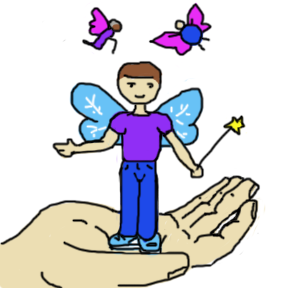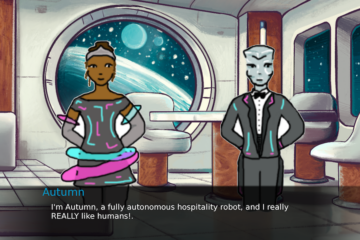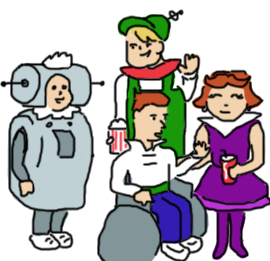Blog post idea suggested by Karrin.
I’ve gotten rejection letters that said “It’s a good story, but it just isn’t science fiction enough.” I think that might be where this question is coming from? How much is enough, then?
Let me take the science out of the equation; how much trope is enough to make a story a specific genre?
Ellen Klages wrote a story that was a hit in our writing workshop. We all loved it. A man caregiving for his adult son who has a mental disability and is entering premature dementia. They go out fishing and the son is pretending to talk to fairies and lift them up in his hands. Beautiful and sad. “But it’s not speculative,” we all said. “Not even a little.”
Next workshop, Ellen brought champagne, having sold the story to a speculative magazine. “Eh, I added a line implying that the fairies are real.”

Don’t be hating Ellen. The story was gorgeous.
The first rule of writing club is: you can break all the rules if your story moves people emotionally.
That said, I’ve also heard complaints from my fellow speculative-fiction readers that their magazines have too many “not really speculative” stories.
Think like an editor. Their magazine has fans, and those fans keep the magazine alive, and they will stop keeping it alive if they don’t get what they want. So these edge-case stories are competing hard for limited slots. Only the best slight fantasy stories break in. You don’t want to be an edge case and compete with Ellen!
So, I guess the answer would be: enough speculative elements so it’s more than a hint of fairies? Ha ha ha. OK OK be more helpful, Marie!
We’ve all heard the Science Fiction definition that there has to be at least one element of imagined science that is integral to the story, that the story would not exist without, but the truth is, a lot of popular and successful science fiction stories are not about the science. My first sale to Analog was a story about a grieving family of tattoo artists. I added a hypothetical tattoo technology based on an article I’d read in Wired. The writing workshop advised me the tech element was too slight, so I added a paragraph where the main character does something new and cool with the tech–using movement to change the 3d tattoo projection.
So, going by my and Ellen’s example, it seems like “Enough” science is “add one more element after your first reader says there isn’t enough.”
I have one story that has gotten rejected multiple times as “not science fiction enough” and it features a darn flying car chase that is resolved with the main character hacking the car! Surely that’s enough spec element?

Well, ok. The setting of the story was grungy–the inner city, and so the feel of the world was very “today.” I sprinkled more spec elements into it, replacing a game of chalk-drawing with a game of tease-the-street-repair-bot, adding a holographic hand fan. Stuff like that. It hasn’t gotten the “not science fiction enough” rejection since then, but has yet to sell.
Geoff Landis, multiple Hugo Award Winning(tm) Hard Science Fiction(tm) Author(tm) and NASA Physicist(tm, R) is one of my workshop partners I quote a lot because (see above) he has as much clout as anyone on these issues. And he frequently starts his critiques with, “I’m going to point out a bunch of physics errors, but this isn’t that kind of story so ignore me.” He knows that there is a type of story that HAS to have all the science ducks in a row, that is aiming at him and the rest of the ultra-nerd audience, and there are stories which frankly aren’t. Sometimes the way forward is to remove all the science.
“Michael Doesn’t Hate His Mother” started out as a science fiction story and I had all these explanations for why his mother was a malfunctioning machine and what the purpose and use of these machines were and why it worked out that society would tolerate a malfunctioning mom-bot and… oy vez it was exhausting. All I’d really wanted to do was write a story about what it was like growing up with my mom. So when I saw that Lightspeed wanted fantasy stories in particular (being full up on science fiction) I just… cut all the explanations and submitted it as fantasy, and it sold and was well-received.
How much science is enough? One thing. One more thing than not enough. Lots of little details. None at all.
Ultimately, the only true answer is: what works for the story, what helps you touch the reader emotionally.
Never forget that there is no perfect story that is so perfect no one can reject it. There is only the story the editor feels fits the magazine’s needs that month, and all we can do is hope we can write that story.


